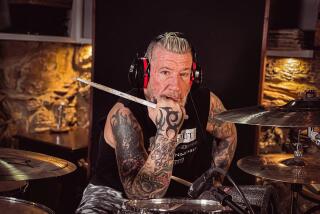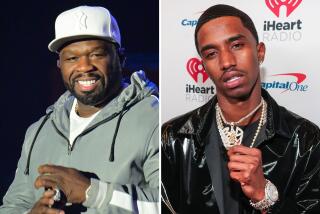His Generation : Rundgren Turns His Talents to Thoughts of Growing Old
Todd Rundgren had a message for The Who’s Pete Townshend, whose 1965 youth anthem, “My Generation,” gave rock ‘n’ roll the immortal line “I hope I die before I get old.”
“We didn’t die,” declared Rundgren by telephone this week. “We got old.”
Rundgren, whose hits include “Hello, It’s Me,” “Can We Still Be Friends” and “I Saw the Light,” was calling from San Rafael in Marin County, where he and his new band were in final rehearsals for a tour that brings them to the Spreckels Theatre on Sunday night.
For almost 25 years, the rock star has created ground-breaking work as a recording artist, producer, video art conceptualist, television and musical-theater composer, and developer of both music and video software. One might have expected, therefore, that Rundgren would steer an interview toward discussion of his new album, “2nd Wind”, and its namesake tour.
But his longtime fans know that Rundgren’s muse is
his ever-expanding world view, so it wasn’t surprising to find him fairly consumed with the psychological ramifications of growing “old.” His polemic on what he termed the “ ‘My Generation’ syndrome” specifically referred to the loss of idealism that frequently accompanies the aging process.
The subject is of such urgency to the 43-year-old Rundgren that he made it the premise of “2nd Wind.” One wondered if the album’s theme of a dream gone awry was the product of a recent, personal epiphany.
“No, not really,” he said. “The album is more a sociological observation of the graying of the hippies as they evolved through yuppie-ism into conservative Republicanism. I’m railing against the darkness, but I’m not sure it does any good at this point. Maybe it’s a natural phenomenon wherein the optimism and energy of youth turns into the conservatism and survivalist pessimism of middle age. If so, ‘2nd Wind’ is offered up as a musical antidote.”
As a prescription, the album convenes several of the musical humors in which Rundgren has dabbled over the years--rock, pop, Philly-style R & B--and also includes three songs he composed for Joe Papp’s 1989 off-Broadway production of the Joe Orton play “Up Against It.”
Rundgren and a large rock band-orchestra recorded “2nd Wind” in front of live audiences over five consecutive nights last July at the Palace of Fine Arts in San Francisco. But it’s not a “concert” album.
For the innovative series of performances, each billed as “A Session with Todd Rundgren,” the theater’s stage was transformed into a “recording studio”--complete with sound-isolating baffles, headphones for the players and multiple miking.
The audiences provided a more organic alternative to the sterile environment of the typical studio, and they in turn got the rare opportunity to eavesdrop on a famous musician at work--mistakes, retakes and all. Fans were also treated to personalized introductions of the songs by Rundgren, who was not above some point-making.
“I believe that inside of every yuppie,” he told the crowd in prefacing the album’s title track, “is a hippie screaming to get out.”
The song “Second Wind” is a strong indictment of the generation collectivized by Townshend’s song. Rundgren sings of youths who have become “cowardly lions . . . glued to the sofa.” But the lyrics are also directed at Rundgren himself, who asks:
“Where was I when we lost power?/ Where was I when lies were spoken?/ Where was I when evil snuck in?/ Where was I when hope was choking?”
The obvious implication is that rock figureheads such as Townshend and Rundgren perhaps haven’t done enough to forestall the complacency that has supplanted the ardor of the children of the ‘60s. In one of several mini-manifestoes, Rundgren told the San Francisco audience, “As long as I have the energy, I want to be a provocateur.”
Good intentions notwithstanding, there has been no viable precedent for the rock equivalent of the elder statesman. And, as he regards the middle-age rockers who are either still holding tight to their constituencies or attempting comebacks, even Rundgren acknowledges that the genre might have forfeited its potency as a social motivator.
“It’s kind of strange to see these gray-haired guys geeking around,” he said. “The problem is that so much of the rock attitude and style becomes formalized after a while, like the Big Band era. When rock no longer annoys your parents, it no longer is a vital, essential art form as far as youth is concerned. I’m not even sure that’s worth agitating over, except for the fact that we occupy such a large demographic bubble.”
One seemingly dignified option for the multitalented Rundgren, who has written music for the television shows “Crime Story,” “Pee Wee’s Playhouse” and “TV 101,” would be to concentrate on his theater and television work. Already, he’s been approached to write music for the next New York Shakespeare Festival, for which “Up Against It” was produced.
“That’s a possibility,” Rundgren said. “Show music has always been a part of my musical evolution. I started out using literal quotes of music by people like Gilbert and Sullivan, and then I began writing music that was theatrical but with no specific theater piece in mind. So the progression to actual show music is a natural one.
“However,” he cautioned, “I’m very wary of being categorized as someone who writes ‘rock musicals.’ That’s a horrific appellation that to me has always seemed a promotional gimmick.”
More likely, according to Rundgren, his involvement in musical theater will remain an adjunct to his solo career. He’ll continue to release albums that reflect his current state of mind, even if they purposefully defy musical currency.
“The music I choose to make is usually pretty reactionary,” he said in an ironic use of the term. “If the music everyone’s listening to at any time is too much in one direction, then I don’t have anything interesting to listen to, so I do something different myself.
“As a result,” he said, laughing, “a lot of my records don’t fall into perspective until years after they come out. When people get bored with whatever the trendy sound is, they discover something I did a couple of years earlier and think, ‘Hey, he must’ve pioneered that.’ But I’m not a pioneer, I’m a reactionary.”
Rundgren’s steadfast refusal to follow prescribed career paths has endeared him to a loyal following of fans, even as it has precluded chart-topping records and antagonized record company execs.
“I’ve come to a recognition and acceptance of the fact that I don’t have a strong relationship with the pop music scene,” he said. “I don’t invest my life in it; I don’t do the things that most other artists are willing to do to remain ‘contemporary.’ So my support is firm, but not large. It’s enough to sustain me, to put me in the category of a Van Cliburn or a Yehudi Menuhin--in the sense that whenever I release a record, there’s an audience for it.”
For someone associated with state-of-the-art technology, largely as a result of his incorporating it into his music, Rundgren is strangely indifferent to the latest advances in music gadgetry. Coming from someone whose past work at times has challenged the landmark albums of the Beatles and the Beach Boys for sheer production ingenuity, “2nd Wind” seems deceptively simple in execution. The suggestion that the artist might be in a “Rundgren Redux” phase elicits a chortle.
“Hey, anyone can buy a sampler and make weird, goofy-sounding records,” he said. “What’s missing these days is a traditional sense of musical discipline. For a while now, my own radio dial has been welded onto a jazz station. Jazz offers variety and a language in which artists can express a broad range of emotions and not get locked into, say, ‘rap rage.’ Rap seems to oblige you to be full of rage, so you become monolithic in terms of what you communicate.
“I feel a lot of different things, and I want to make music that speaks of them all,” he said. “I want to work with musicians who’ve developed the skill to express a lot of nuances, as well.”
The musicians Rundgren has chosen for the “2nd Wind Tour” include drummer Prairie Prince of the Tubes; percussionist Mingo Lewis; keyboardists Byron Allred (who played on Rundgren’s “Nearly Human” album and tour) and New York-based Ron Sabino (who has worked with Madonna and David Bowie); horn players Bobby Strickland and Max Hackett; bassist Larry Tagg (another “Nearly Human” alumnus, from the band Bourgeois Tagg); Bay Area guitarist Jesse Gress, and backup vocalists Michele Gray and Shandi Sinnamon.
“Now that I mention it,” Rundgren said, “I’d better get to rehearsal. I overslept today and I’m running late. See you in San Diego.”
Todd Rundgren will perform at 8 p.m. Sunday at the Spreckels Theatre, 121 Broadway, San Diego.
More to Read
The biggest entertainment stories
Get our big stories about Hollywood, film, television, music, arts, culture and more right in your inbox as soon as they publish.
You may occasionally receive promotional content from the Los Angeles Times.






